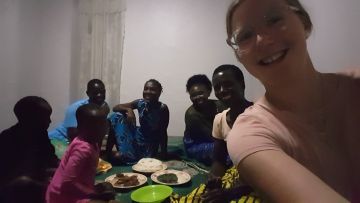A night in Kwanjana
19 April 2022
Hello! I’m a Dutch Canadian who recently visited Malawi for a vision trip. My foremost goal was to learn about an agricultural ministry being developed there, but during my time in Malawi, I also had the privilege of observing some other ministries and learning about Malawian culture. One of these privileges was staying overnight in the village of Kwanjana, where the “For a Change” ministry projects are located. I have been asked to share my experience with you all to give you an idea of what village life looks like in Kwanjana and how the “For a Change” ministries have impacted the local people.
I arrived at the “For a Change” nursery school part-way through a busy morning, while all the nursery children were in class. During my visit, I was able to take a tour of the nursery project, observe in some of the classrooms, enjoy lunch with staff from the project, and join a Bible study hosted for the village women. It was a blessing to see and hear about all the different ministries going on in the area!
After school was over and everyone headed home, Flora, one of the three school teachers, brought me to her home, a small duplex on the school property. After settling my things in and having a little tour, we grabbed a large mat and headed outside for tea. A few other friends gathered around on her porch and we sat chatting while Rebecca (another school teacher) lit her small charcoal cooking stove to make pan-cooked popcorn and Flora boiled the water for tea. Once the tea was ready, we all sat together on the mat, enjoying each other’s company and chatting in Chichewa (the local language).
The ladies then took me on a tour of the village. They were very excited to show me around! On our way we passed through a large group of boys playing soccer on a dirt field in the school, kicking their ball into soccer nets made of 3 simple timbers nailed together. We met up with many friendly neighbors, passing along the rutted road. A couple of ladies we met invited us to their homes. At each of these homes, we gathered on their concrete porches to talk for a few minutes and then continued on our way. For most of the locals, it was very excited to have a "msungu" (a white person) stay in their village. One lady even said, “God will bless us because you are sleeping here tonight.” As we were walking, Flora and Rebecca pointed out the houses built by “For a Change”. They explained how much impact the new homes have on the local families. Overall, the families that move into these homes are much happier. There is less discord and tension in families when placed in safer, cleaner and more stable environment. Because the children's basic needs are being met more appropriately, they come to school more joyful and carefree. What a blessing this project has been in their lives!
On our way through the village, we also stopped by the local shop – a small dirt-floored room in a man's house. He sold staple foods like bread and flour, and snack foods like chips and candy out of this small dark room. Little bags and packages of various goods hung on strings hanging from the rafters. Larger items were scattered around on the shelves and the floor - a very typical Malawian convenience shop. Flora bought some bread and peanut flour through a small barred window. Very different from the typical Canadian grocery store experience!
After we returned from our walk, the ladies started cooking supper. Flora showed me how they cook their chicken, freshly slaughtered and prepared with salt, oil, and tomatoes. Rebecca showed me how to make their “relish”, a dish of boiled greens. When those dishes were prepared along with the nsima, a thick porridge made with fine corn flour, we gathered on a mat in Rebecca's sitting room to eat. We ate our nsima in the traditional way - everyone gathered on the floor around the three serving dishes. Each of us dug in with our fingers, rolling the steaming nsima in a smooth ball in our right hands, pairing it with bites of greens or chicken. On this particular occasion, the women had to break off some small pieces of nsima to cool off for me, since my fingers were not cultured enough to handle the heat of eating freshly prepared food. By Western standards, this way of eating would be considered unorthodox and unsanitary, but it is really quite nice! Sharing nsima like this provides a strong sense of community and friendship.
Following dinner, the neighborhood friends headed out, we cleaned up a little and prepared for bed. As I got ready for bed, I turned on my phone data to update my friends and family back home. It made me laugh to think that I was in a place with no running water, no direct power, and a hole in the backyard for a toilet, yet I was still able to pick up my phone and speak “face-to-face” with my family and friends halfway around the globe.
When I woke up the next morning are 6:30, there were already neighbors gathered around the house to say good morning. They hung out and talked outside while Flora and Rebecca washed dishes, prepared breakfast, and got ready for the day. For many Malawians, much of their life is spent outdoors, doing most of their cooking, cleaning, and washing up outside. When you use coal stoves and don’t have indoor plumbing or lighting, it is the most practical thing to do. That way the ash from the stove can fall on the ground, any dirty water can simply be thrown into a nearby bush, and the sun can be the light on your work. For many people, this would be considered a primal way of life, but the simplicity is attractive to some degree. Especially in a gorgeous place like Kwanajana where you wake up in the morning overlooking lush valleys and misty mountains all around. Early in the day the only sounds to be heard are the morning birds and the odd moo or bleat of a cow or goat – so peaceful. Kwanjana is definitely a place a would consider vacationing at for a week or two!
After breakfast, we participated in the food aid distribution, where the "For a Change" workers handed out pantry supplies to almost 500 people! It was a very joyful morning for both those distributing the food and those receiving it. This outreach was a very visible demonstration of the Church providing for the needs of the poor and the helpless– a sight that gives cause for immediate joy and thanksgiving!
Ah, my stay in Kwanjana was very nice! It helped me to become more familiar with the villager lifestyle and gained an appreciation for their simple way of life. The average Malawian villager does not have much materially, often not even enough to eat, but they do have a very strong sense of community and deep care for each of their neighbors. As a whole, these people are very invested in each other's lives, always willing to come together, share, and help one another in whichever capacity they are able. I have been very blessed to witness the work that “For a Change” has been doing in Kwanjana and pray that God will continue to richly bless their efforts and grow their ministry in the hearts and lives of the villagers there.


